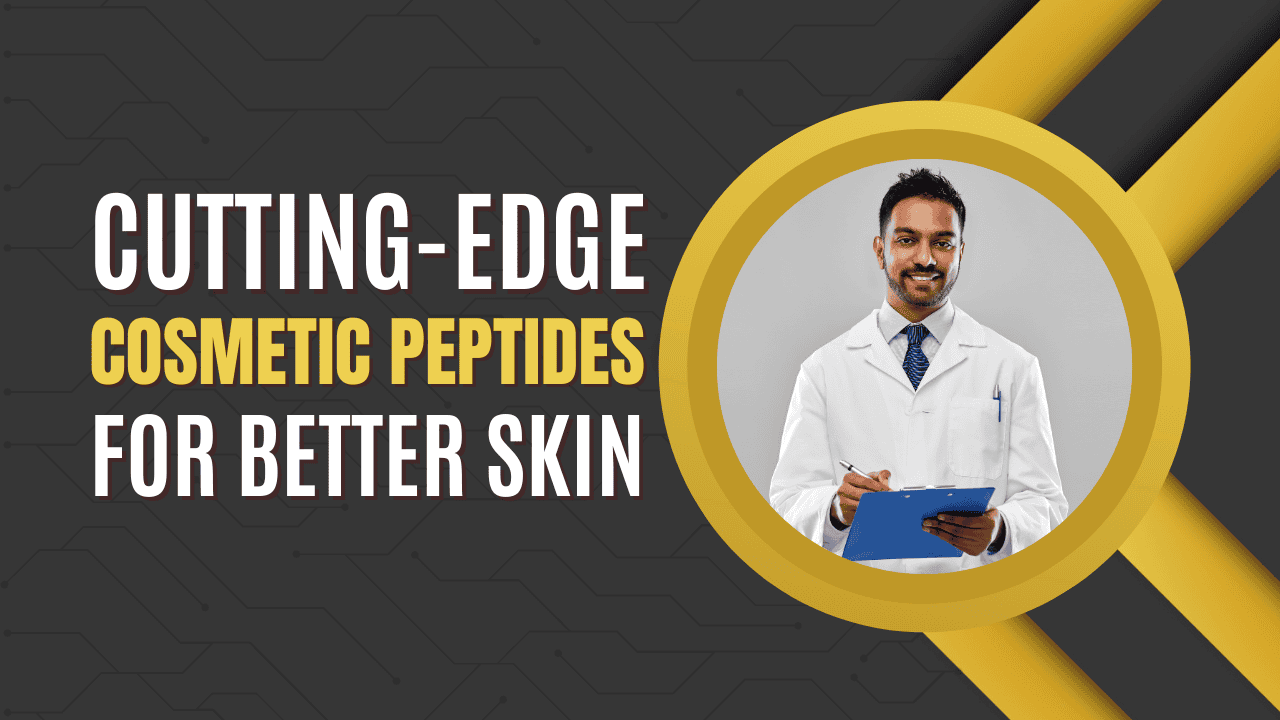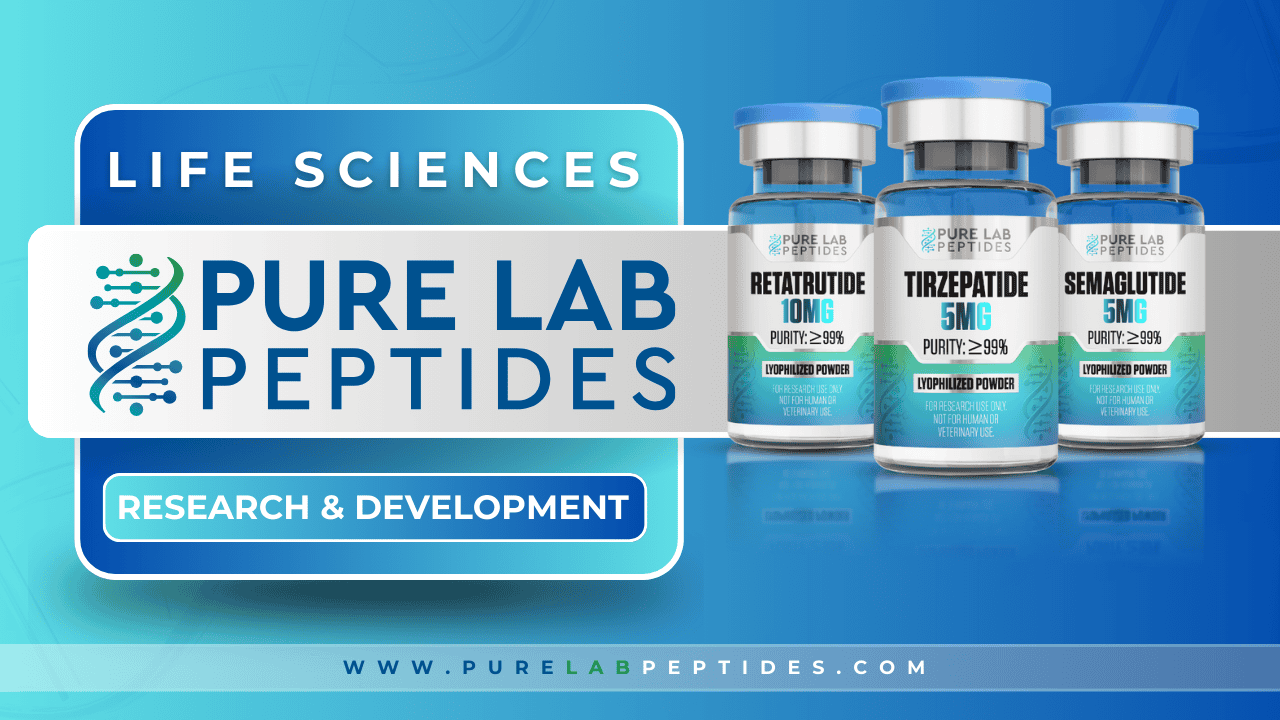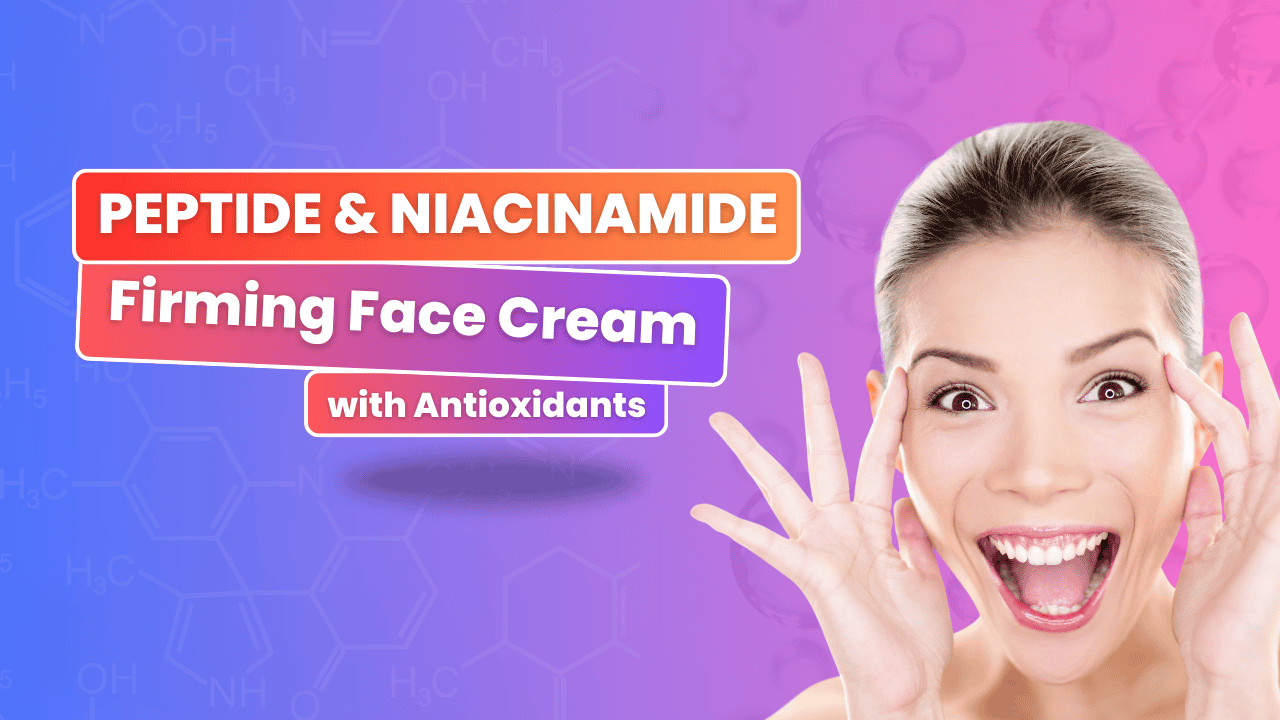

In the ever-evolving world of cosmetic science, peptides have emerged as one of the most promising solutions for enhancing skin care.
This article delves into the fascinating realm of cosmetic peptides, exploring their synthesis, functionality, and the groundbreaking ways they can rejuvenate and protect the skin.
You’re in for an enlightening journey through the molecules that could revolutionize your skincare routine.
Peptides are short chains of amino acids that play a critical role in several biological processes, including skin health. In cosmetics, peptides are heralded as miracle workers for their ability to stimulate collagen production and improve skin elasticity.
Peptides are crucial because they act as signaling molecules that instruct skin cells on how to function. Whether it’s stimulating collagen synthesis or aiding in wound healing, peptides can dramatically improve skin health and appearance.
When applied topically, peptides can penetrate the skin barrier, reaching deeper layers where they stimulate skin cells. This activity of peptides triggers the skin to produce more collagen and elastin, enhancing skin firmness and reducing wrinkles.
Peptides have gained prominence for their anti-aging properties. They help in reducing skin wrinkles and fine lines by improving skin elasticity. Additionally, peptides support the skin’s extracellular matrix, offering a more youthful appearance.
There are various peptides like signal peptides, carrier peptides, and neurotransmitter inhibitor peptides each serving unique functions such as stimulating collagen, delivering active ingredients, or reducing muscle contractions that cause wrinkles.
Bioactive peptides are specialized chains that can positively influence bodily functions. In skin care, these peptides possess properties that can enhance skin health.
A peptide becomes bioactive when it can affect biological activities significantly. These bioactive peptides work by interacting with skin cells, encouraging processes like collagen production and skin repair.
Bioactive peptides enhance skin rejuvenation by stimulating skin repair mechanisms. They can improve skin elasticity, reduce inflammation, and enhance collagen synthesis, leading to a firmer, smoother complexion.
Bioactive peptides mimic natural skin processes, binding to skin receptors and activating biological pathways that lead to improved skin health and elasticity.
Bioactive peptides are subjects of intense research within the field of cosmetics. Studies have shown that they can significantly impact collagen production, reducing the signs of aging while improving overall skin health.
Peptide synthesis is an intricate process crucial for the development of effective skin care peptides. The methods used ensure the stability and functionality of cosmetic peptides.
Peptides are synthesized through solid-phase peptide synthesis, where amino acids are sequentially added to a resin-bound peptide chain. This custom synthesis guarantees high purity and function.
Common methods include solid-phase synthesis, liquid-phase synthesis, and recombinant DNA technology. These methods ensure precise peptide production to retain the bioactivity required for skin care.
One of the main challenges is ensuring the stability of peptides when incorporated into skincare products. Proper formulation is essential to maintain peptide activity upon application.
Advancements such as automated peptide synthesizers and improved purification techniques are making peptide manufacturing more efficient and cost-effective, broadening their application in cosmetics.
Signal peptides are known for their ability to communicate with skin cells and regenerate youthful skin.
Signal peptides are short peptides that guide cellular processes, including collagen synthesis and skin repair. These peptides activate skin cells, encouraging the production of essential proteins.
Signal peptides work by stimulating skin fibroblasts to produce more collagen and other extracellular matrix components. This enhances skin firmness and reduces signs of aging.
Unlike other peptides, signal peptides directly influence skin cell behavior, making them particularly effective for anti-aging and skin regeneration.
Peptides such as palmitoyl pentapeptide-3 and palmitoyl tripeptide-5 have shown to improve skin texture and elasticity. These peptides are often key ingredients in high-end anti-aging skincare products.
Acetylated peptides are modified for improved performance and stability, making them fundamental in advanced skincare formulations.
Acetylation enhances peptides’ stability and increases their skin permeability, ensuring they are more effective in reaching deeper skin layers.
Acetylated peptides offer superior anti-aging benefits by maintaining stability and bioactivity for longer periods. This leads to more consistent and noticeable improvements in skin health.
Look for products that list acetylated peptides like acetyl hexapeptide-8, which are renowned for their wrinkle-reducing properties and skin rejuvenation effects.
Acetylated peptides generally outperform non-acetylated ones in terms of stability and effectiveness, making them a preferred choice in cutting-edge skincare products.
Carrier peptides are essential for delivering active ingredients deep into the skin, enhancing their effectiveness.
Carrier peptides transport key ingredients into the skin cells, ensuring these active components are effectively utilized.
Carrier peptides work by forming stable complexes with other molecules, facilitating their entry into skin cells and boosting their bioavailability.
Peptides like palmitoyl s are known for their carrier functions, delivering vital nutrients to the skin for improved health and appearance.
Carrier peptides help overcome skin’s natural barrier, ensuring that the active ingredients reach deeper layers where they are most needed.
Tripeptide-1 is a standout in the world of anti-aging peptides, known for its impressive skin benefits.
Tripeptide-1 is a three-amino-acid peptide renowned for its ability to mimic the body’s natural communication mechanisms, promoting skin repair and collagen synthesis.
Tripeptide-1 offers potent anti-aging effects by stimulating collagen production, enhancing skin firmness, and reducing the appearance of fine lines and wrinkles.
To maximize its benefits, look for serums or creams formulated with Tripeptide-1. Regular application can lead to firmer, more youthful-looking skin.
Research indicates that Tripeptide-1 significantly increases collagen and glycosaminoglycan production, improving skin texture and elasticity over time.
Myristoyl peptides are another group known for their exceptional skin rejuvenation properties.
Myristoyl is a fatty acid that, when attached to peptides, enhances their ability to penetrate the skin, leading to better absorption and effectiveness.
Myristoyl pentapeptide-17 is praised for its role in promoting skin rejuvenation and hair growth, thanks to its capacity to stimulate the natural production of growth factors.
These peptides improve skin firmness and elasticity by stimulating collagen production and supporting skin regeneration processes.
Incorporate myristoyl peptide-infused creams or serums into your morning and evening routines to maximize their rejuvenating effects.
Neurotransmitter inhibitor peptides are game-changers when it comes to reducing expression lines and wrinkles.
These peptides block the signals that cause muscle contractions, helping to smooth out wrinkles and fine lines.
They relax facial muscles, potentially reducing the depth and severity of expression lines, leading to smoother, younger-looking skin.
By inhibiting neurotransmissions to facial muscles, these peptides prevent the repetitive movements that contribute to wrinkle formation.
Acetyl hexapeptide-8 is one of the most famous neurotransmitter inhibitor peptides, often used in high-end anti-aging products for its muscle-relaxant properties.
Creating effective skincare formulations often involves combining several types of peptides for enhanced results.
Start with a peptide-enriched cleanser, followed by a serum that combines signal peptides and carrier peptides for comprehensive skin benefits.
Combining peptides like tripeptide-1 with signal peptides can offer synergistic effects, enhancing collagen synthesis and skin repair more effectively than single peptides alone.
To avoid overloading the skin, use products with recommended concentrations of peptides. This ensures optimal effectiveness without causing irritation.
Store these products in a cool, dark place to maintain peptide stability and effectiveness. Follow manufacturer recommendations for best results.
Peptide research continues to evolve, bringing forth innovative solutions in the cosmetic industry.
Emerging technologies in peptide synthesis and formulation are leading to longer-lasting, more effective peptide-based skincare products.
The future promises more personalized peptide treatments, targeting specific skin concerns with a high degree of precision and custom synthesis.
Leading manufacturers are investing heavily in peptide research, developing novel cosmetic formulations that offer visible results and improved skin health.
Brands like [Brand A] and [Brand B] have successfully incorporated cutting-edge peptides like acetyl hexapeptide-8 and palmitoyl tripeptide-5 into their products, receiving rave reviews for their anti-aging effects.
Peptide inhibitors play a critical role in modern anti-aging treatments.
Peptide inhibitors are molecules that block specific pathways or enzymes, leading to beneficial effects like reduced collagen breakdown and improved skin elasticity.
These inhibitors work by preventing the degradation of collagen and elastin, essential components for maintaining youthful, resilient skin.
Unlike traditional anti-aging ingredients, peptide inhibitors offer targeted action, potentially leading to more noticeable and sustained anti-aging effects.
Peptides like acetyl hexapeptide-8 are among the most effective inhibitors, offering visible improvements in skin firmness and texture.
Selecting the right peptide-containing products can make all the difference in your skincare regimen.
Look for clinical evidence supporting their effectiveness, and check the ingredient list for known peptides like tripeptide-1 and palmitoyl pentapeptide-3.
Understand the label terminology: “palmitoyl,” “acetyl,” and other prefixes can indicate the type and function of peptide included.
Avoid products that don’t list peptide concentrations or that include unnecessary fillers, which can dilute the peptides’ effectiveness.
Reading reviews can provide insights into how well these products work in real-world conditions, helping you make informed decisions.
With this kind of understanding, you’re now equipped to navigate the complex, yet fascinating world of cosmetic peptides, unlocking the secret to truly radiant and youthful skin.
Cosmetic peptides are short chains of amino acids used in skincare to enhance various skin functions. They stimulate collagen production, improve elasticity, and can aid in reducing skin roughness and pigmentation. Peptides are active ingredients in cosmetic products due to their ability to penetrate human skin and stimulate skin regeneration, making them valuable for anti-aging and skin protection. These functional peptides contribute to improved skin firmness and overall health.
The best peptides for facial skincare include:
Yes, peptides in skincare are worth it. They offer numerous benefits such as stimulating collagen synthesis, enhancing skin elasticity, and reducing signs of aging. Evidence shows that peptide-infused personal care products can significantly improve skin texture, reducing wrinkles and providing skin protection against oxidative stress.
Peptides and hyaluronic acid serve different functions. Peptides:
Acetyl Hexapeptide-8, known for its anti-wrinkle properties, makes you look younger by reducing expression lines and enhancing skin firmness. This peptide inhibits neurotransmitter release, thus relaxing facial muscles and smoothing wrinkles. Another effective peptide is Tripeptide-1, which boosts collagen production and improves skin elasticity, providing a youthful appearance.
The top 5 peptides in skincare are:
One of the best peptide serums for aging skin is a product containing a combination of Acetyl Hexapeptide-8 and Palmitoyl Tripeptide-5. These ingredients for cosmetic purposes improve collagen synthesis and skin elasticity, reducing wrinkles and providing a firmer appearance. Look for serums with a high concentration of these peptides for optimal results.
The four primary types of peptides used in cosmetic applications are:
Peptides in skincare improve skin health by penetrating the skin barrier and stimulating biological processes. They:
Peptides and retinol offer distinct benefits. Peptides:
Dr. Samuel J. Lin is a recognized authority in dermatology and cosmetic surgery, with an extensive focus on the applications of peptides for skin rejuvenation and anti-aging. With over 20 years of experience in the field, Dr. Lin’s work combines clinical practice and innovative research, bridging the gap between science and real-world cosmetic applications. His contributions have been instrumental in advancing our understanding of how bioactive peptides can enhance skin care solutions.
Dr. Lin’s notable publications include:
Dr. Lin’s dedication to dermatological science has earned him multiple accolades, including the American Society for Dermatologic Surgery Award. His research is characterized by a commitment to improving skin health and elasticity, establishing him as a trusted and authoritative figure in the field.
Dr. Kateryna Bazaka is a leading researcher in the field of peptide chemistry and nanotechnology, with a particular interest in the development and synthesis of novel cosmetic peptides. Dr. Bazaka’s extensive background in bioengineering and materials science complements her innovative approach to creating functional peptide ingredients for use in cosmeceutical products. Her interdisciplinary expertise has paved the way for breakthroughs in peptide synthesis, enhancing the stability and efficacy of skincare formulations.
Key publications by Dr. Bazaka include:
Dr. Bazaka’s contributions to peptide science have been acknowledged with several prestigious awards, including the International Peptide Society’s Award for Outstanding Research. Her work is not only inventive but also crucial in establishing new standards for peptide efficacy and safety in personal care products.
Barba, C., Méndez, S., Roddick‐Lanzilotta, A., Kelly, R., Parra, J. L., & Coderch, L. (2007). Cosmetic effectiveness of topically applied hydrolysed keratin peptides and lipids derived from wool. Skin Research and Technology, 14(2), 243–248. https://doi.org/10.1111/j.1600-0846.2007.00280.x
Bueno‐Mancebo, J., Barrena, R., Artola, A., Gea, T., & Altmajer‐Vaz, D. (2024). Surfactin as an ingredient in cosmetic industry: Benefits and trends. International Journal of Cosmetic Science. https://doi.org/10.1111/ics.12957
Burnett, C. L., Boyer, I. J., Bergfeld, W. F., Belsito, D. V., Hill, R. A., Klaassen, C. D., Liebler, D. C., Marks, J. G., Shank, R. C., Slaga, T. J., Snyder, P. W., & Heldreth, B. (2022). Safety assessment of Plant-Derived proteins and peptides as used in cosmetics. International Journal of Toxicology, 41(2_suppl), 5S-20S. https://doi.org/10.1177/10915818221100700
Chan, L. K. W., Lee, K. W. A., Lee, C. H., Lam, K. W. P., Lee, K. F. V., Wu, R., Wan, J., Shivananjappa, S., Sky, W. T. H., Choi, H., & Yi, K. (2024). Cosmeceuticals in photoaging: A review. Skin Research and Technology, 30(9). https://doi.org/10.1111/srt.13730
Hou, J., Wei, W., Geng, Z., Zhang, Z., Yang, H., Zhang, X., Li, L., & Gao, Q. (2024). Developing plant exosomes as an advanced delivery system for cosmetic peptide. ACS Applied Bio Materials, 7(5), 3050–3060. https://doi.org/10.1021/acsabm.4c00096
Kanlayavattanakul, M., & Lourith, N. (2009). Lipopeptides in cosmetics. International Journal of Cosmetic Science, 32(1), 1–8. https://doi.org/10.1111/j.1468-2494.2009.00543.x
Ledwoń, P., Errante, F., Papini, A. M., Rovero, P., & Latajka, R. (2020). Peptides as active ingredients: a challenge for cosmeceutical industry. Chemistry & Biodiversity, 18(2). https://doi.org/10.1002/cbdv.202000833
Lupo, M. P., & Cole, A. L. (2007). Cosmeceutical peptides. Dermatologic Therapy, 20(5), 343–349. https://doi.org/10.1111/j.1529-8019.2007.00148.x
Rinaldi, F., Marzani, B., Pinto, D., & Sorbellini, E. (2018). Randomized controlled trial on a PRP-like cosmetic, biomimetic peptides based, for the treatment of alopecia areata. Journal of Dermatological Treatment, 30(6), 588–593. https://doi.org/10.1080/09546634.2018.1544405
ALL ARTICLES AND PRODUCT INFORMATION PROVIDED ON THIS WEBSITE ARE FOR INFORMATIONAL AND EDUCATIONAL PURPOSES ONLY. The products offered on this website are intended solely for research and laboratory use. These products are not intended for human or animal consumption. They are not medicines or drugs and have not been evaluated or approved by the FDA to diagnose, treat, cure, or prevent any disease or medical condition. Any form of bodily introduction is strictly prohibited by law.







Discount Applied Successfully!
Your savings have been added to the cart.